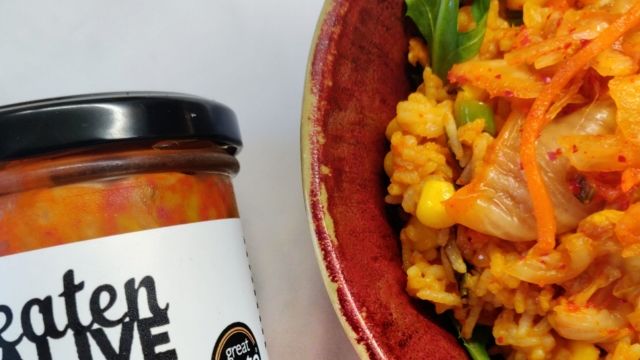Gut-friendly snack becomes surprise lockdown favourite. By Sophie Morris

What’s the first thing you put in your mouth in the morning? A toothbrush? A gulp of strong tea? For Pat Bingley, it’s usually some spicy fermented cabbage, to allow its natural probiotics to travel as far as possible into his digestive system.
“It’s a great snack,” he insists. “It has a bit of salt, hardly any calories, and is so flavourful - sour, salty and a little bit spicy. Eat it with a cracker, or a slice of avocado or apple.”
For years, those in foodie circles have hyped kimchi as the next big thing, extolling the Korean snack for its “friendly” bacteria and great taste. In Korea, it is an integral component of the national diet, eaten on its own and in many recipes, and has great cultural significance. In the UK, it has until recently been mostly restricted to gut-health enthusiasts or foodobsessed folk.
But our search for healthier lifestyles and interest in traditional kitchen methods are leading more of us to this Korean cabbage dish. UK social media mentions of preserving and fermenting are up by 28 per cent and searches on Waitrose.com for “pickling” are up 222 per cent. “The nation is experimenting with preservation techniques using spare cupboard food, whilst reducing waste continues to be high on the criteria,” claims the supermarket.
Kimchi is typically made with Napa cabbage, garlic, ginger, gochugaru chilli flakes or powder, and fish sauce or dried shrimp, though many producers are making vegan versions.
Fermenting is different to pickling in vinegar because the acidity comes from the vegetables themselves, as lactic acid-forming bacteria which thrive in fresh salted produce. Sterilising foods strips out this natural goodness.
Bingley, 37, is one of the food lovers who have been keen on fermenting for some time. He and his business partner Glyn Gordon worked in Michelin-starred kitchens at a time when chefs were turning away from Heston-style molecular gastronomy and investigating heritage techniques. They were, he says, “fermentation hobbyist nutters”. They set up Eaten Alive in 2016 to supply restaurants including the Gordon Ramsay Group, Tonkotsu, Chick ‘n’ Sours, and some wholefood shops and delis.
“A lot of the cult foods people become obsessed with are fermented,” Bingley points out. “Wine, sourdough, cheese… fermentation creates new flavours, and complexities of flavours, and there’s a craft aspect which means no two will ever be identical.”
When the restaurant trade disappeared last March, says Bingley, the Eaten Alive online shop “went ballistic”. In November they sold eight times more kimchi than in March, and attribute this to our increased interest in overall health and especially gut health.
Leon and Gail’s have added Eaten Alive’s kimchi to their menus. But for the majority of us stuck at home a new subscription service can deliver fizzing ferments to your doorstep - hot sauces matured for up to six months as well as many types of kraut and kimchi.
I first tasted kimchi in a Korean restaurant off London’s Tottenham Court Road, the same area where Daphne Besseling, who is from the Philippines, first found the ingredients to make her own after moving to London. She later set up Daphne’s Pickled Pantry and makes and sells kimchi and kombucha online and at farmers’ markets. She recently started a Korean takeaway kitchen serving kimchi jigae, a classic stew made with pork, tofu and aged kimchi.
There are many evangelists for gut health, but its meaning is fuzzy. Bingley says it’s not possible to make claims about what his fermented products may do, but feels sure that current health concerns have led people to kimchi, and that it cured his own heartburn.
“There’s been a lot of chatter about links between gut health and levels of sickness,” he says. “There’s a line drawn between people’s gut health and their general health.”
eatenalive.co.uk
thepickledpantry.square.site